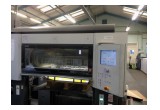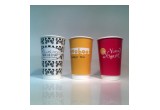
We interviewed Leslier Carr and Steve Morris of Scyphus, a paper product manufacturer to gauge how the paper cup industry is reacting to growing demand and how that might affect the already worrisome growth of landfills with non-compostable garbage, and also on how Brexit will affect their relations with the mainland European market
Little Houghton,UK, June 9, 2017 (Newswire.com) - The ever growing coffee culture across Europe, millennials and their fixation for something more than just caffeine, and the retail market reorganising itself back from malls to high streets, coffee shops and specialty cafes are booming across the U.K., and so is the demand for coffee paraphernalia.
The demand for branded coffee cups is also seeing a sharp rise. Coffee shops are moving from plain white cups to branded ceramics for in-shop services and branded paper cups for both in-shop and take away services. The quality of paper cups have improved over the years and so has the general sentiment towards eco-friendly, biodegradable and recyclable paper cups.
"Part of our love affair with coffee seems to be tied up in the ritual and history of drinking it ... For centuries, gatherings over a cup of coffee have generated a collective mystique that every generation wants to join in on, wants its piece of, wishes to call its own."
Valli Keller, Javahouse Journals
We talked to Leslie Carr and Steve Morris of Scyphus, one of the U.K.'s specialised printed paper cups manufacturers, who have been manufacturing high-quality paper cups from their paper cup plant in Little Houghton, Northampton.
We asked them how they have been manufacturing in the U.K. for decades and still compete with many other U.K. firms that have been successfully off-shoring their manufacturing to the Far East.
The next most important question was, how does a manufacturer in Northampton get to sell to customers across Europe?
We also asked them their view on the manufacturers' responsibility towards eco-friendliness and how they plan to handle increasing demand for eco-friendly cups.
And then we asked the most important questions: how to keep a U.K. Manufacturing Company running in this competitive industry, how are these sectors of industry sustaining and what is their general idea on the effects of Brexit on them.
Q. How do you manage to manufacture in the U.K. and still provide lower costs as you say?
Lez: We hire local labour and engineering & services are mostly handled in-house. With printing and manufacturing and everything being in-house, we can cut on lead times and do not have to pay profit margins to the actual manufacturer in some Far East country. We have increased our capacity to over 10 million cups. We have installed new 8oz and 12oz machines that have increased our capacity and speed and thus cut down the lead time, while also allowing us to cater to both short run customers and bulk order customers without compromising on price or quality for anyone.
Steve: With modern courier services, both in the U.K. and across Europe delivery speed has increased manifolds too, and thus we can cater to a larger customer base and our reaction time has improved to a surprisingly high level with modern ERP systems driving the entire workflow from quotation to delivery.
We have been continually increasing our capacity by adding faster and better cup forming machines, and during the fiscal year 2015/16 and 2016 and till the second quarter of 2017, we have been investing heavily in infrastructure, adding more factory space, new electricals to accommodate more machines and adding to our warehousing facility, to offer free storage to customers who don't want to store at their facility but would want to receive the bulk order discounts nevertheless.
Q. Outreach: Isn't that a problem? How do you reach out to customers across Europe?
Lez: Success of a manufacturer depends on the product indeed, but a lot depends on a dedicated team of sales managers too, the customer-facing people who engage with local businesses; not just coffee shops, but event managers, car dealers and others who need branded paper cups as a customer satisfaction and welcoming initiative (to serve coffee and other drinks) and interact with them and break the myth that U.K. manufacturing is costlier and slower than importing lower quality products from the Far East.
Social media online presence works as the remote sales force in the modern business ecology. The age-old days of cold calling and newspaper inserts and paper advertisements were the only way of engaging with customers when we started. That has now been largely supplemented with online media versions of the same media outlets, interactive promotions and brand engagement platforms, and we make use of them to reach out to the customers.
For the European market, which has a very big potential of growth for U.K. companies despite the initial apprehension after the Brexit Referendum, we have partner agencies who interact with customers on our behalf.
Steve: France and Germany are the two major markets for Branded Paper Cup Products, and the partnership with them is every growing.
Q. How are you catering to the growing demand for biodegradable paper cups? What is your take on your environmental responsibilities?
Lez. As a responsible manufacturer we obtain our papers from paper mills that support sustainable forests and are FSC and PEFC accredited, but there is a myth that paper cups are not eco-friendly and are not biodegradable at all. This is a partial myth; yes, the PE coating on a traditional paper cup is non-biodegradable and the paper cup takes time to compost if not disposed properly. But if disposed properly as recyclable material and not contaminated with other garbage, the PE can be extracted successfully and the paper can be 100% recyclable.
Steve: We must note that PLA Coated Paper Cups have been around for years, but PLA cups had the reputation of being not so good for hot liquids. However, recent R&D and mixed resin PLA has proved to be a successful PE alternative and we are producing bio paper cups successfully at our plant for a while now.
Lez: For a paper product industry, the other great responsibility is waste disposal at our end. We can't trash our rejects and paper wastes along with other garbage, and we have Viridor U.K. picking up recyclable waste from our plant for years now.
Q. How are you holding on as a U.K. Manufacturer, post Brexit?
Steve: Nothing seem to have been affected yet, except for the initial plunge of the Pound Sterling. In fact, our sales volume in France has seen an increase, and we are getting more inquiries from many other European countries that we have not serviced earlier.
Source: Scyphus, UK
Share:



